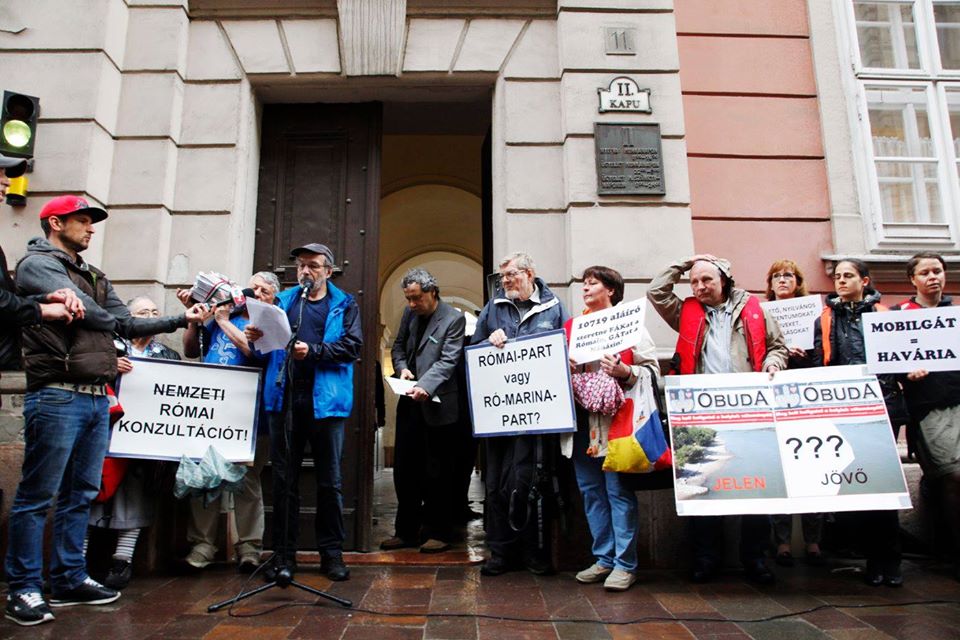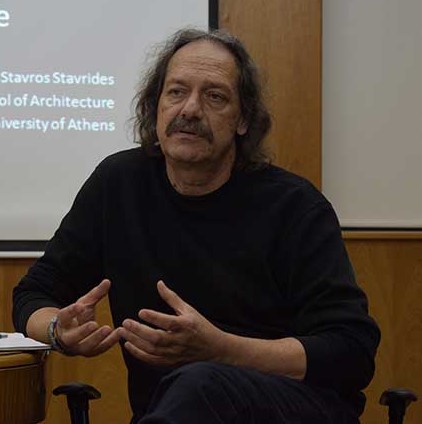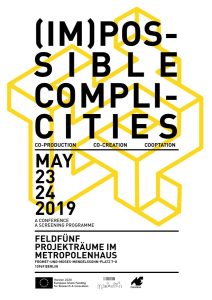
The program, originally conceived a symposium to be held in Berlin, was affected by restrictions due to COVID-19, and was realised as a web series.
November 26th, 2021 h.20:00 CET
Prof. Michael Edwards, The Bartlett School of Planning- UCL London UK / INURA.
The Just City: community led planning, networking action, research and policy making.We are excited to be opening the series with guest Michael Edwards, professor at the Bartlett School of Architecture at UCL and a fellow member of the International Network of Urban Research and Action.
Michael has been a great inspiration for us with his tireless ability to combine academic teaching and political engagement, connecting theory and critique of urban economics with the struggles of grassroots movements. During the conversation we will explore his experience as part of the Just Space network and discuss the importance of connecting urban movements internationally and the complexities of translating urban concepts into different languages and cultures.


Prof Michael Edwards studied planning at UCL from 1964. He then worked in Nathaniel Lichfield’s practice, doing most of the economic inputs to the Plan for Milton Keynes and learning the joys and hazards of working in a multi-disciplinary team. He became a lecturer in the Bartlett School at UCL in 1969, where he has enjoyed working ever since. He was active, throughout its life, in the Bartlett International Summer Schools on the Production of the Built Environment (BISS), a marxist forum which met annually from 1979 to 1996, developing a strong dependence on international debates with comrades. He went on to be a founder of the International Network for Urban Research and Action INURA which has been a uniquely fertile ground for intellectual and practical discussions ever since, feeding into all the work in London on resistance to the property market dominance of how the city and its neighbourhoods develop, much of it organised through the Just Space network.
Michael blogs at michaeledwards.org.uk (where his publications can also be downloaded) and is active on Twitter as @michaellondonsf .



January 25th, 2022 h.21:00 CET
Dr. Ivàn Tosics of Metropolitan Research Institute, Budapest HU, EU URBACT Programme Expert.
The EU urban dimension, policy integration and the new funding period.
Iván Tosics is the Co founder of the Metropolitan Research Institute (MRI), Budapest, Ivan is a sociologist (Ph.D.) with long experience in urban sociology, strategic development, housing policy, and EU regional policy issues. Since 2011 he serves as Programme Expert at the URBACT programme and teaches at the University of Pécs, Department of Political Studies, Doctoral School. He is vice-chair of the European Network of Housing Research (ENHR), executive committee member of the European Urban Research Association (EURA). He is the Policy Editor of the journal ‘Urban Research and Practice’, and publishes extensively on topics like integrated urban development, urban renewal, metropolitan areas, EU urban policies, dilemmas of post-Covid urban development.
Honoured over many years to be working with Ivan, for Tesserae he is more than a simple colleague. He is a friend and the most passionate, attentive, and yet humble thinker who has always an unexpected-and still very plausible- point of view on the complex discussions over urban matters. The fastest note-taker in the world, with always a camera in his hand, one can be sure Ivan records any possible observation at meetings and site visits. Moreover, his background and extensive work in post-socialist countries provide contributions that challenge the comprehension of today EU urban policies and urban development. In our dialogue, we will listen to Ivan personal experiences and memories from three decades’ work on EU matters, and the illusions, results, and disappointments.
Starting from comparative work on housing and urban development, he became deeply involved into EU matters already from the middle of the 1990s, i.e., one decade earlier as Hungary joined the EU. Throughout the three decades, Ivan was always a critical observer of the architecture of the EU political construction, analysing all elements of its vertical structure, from the local governments, through the nation-states up to the complex web of EU institutions. In the talk, he will address questions and dilemmas as acts of a drama play.
Prologue: Early understanding in 1990 of the limits of research to influence policymaking. Why housing privatization couldn’t be stopped in post-socialist countries, although we could foresee all its disastrous consequences?
Acts of the drama
- The Urban Agenda – what has changed since the first announcement in 1998?
- How could the new member states convince in 2006 the European Commission to give up its complete ban on spending EU money on housing?
- What kind of innovations emerged in the new member states in the 2000s and why many of these proved to be short-lived?
- The ITI story: why do countries react in totally different ways on innovative EU initiatives?
- The real gatekeepers in the implementation of EU policies: how could the total control of national governments be alleviated?
Epilogue: How can critical thinkers influence policymaking? How long can illusions be chased and what to do when illusions fade away?
Find here the slide presentation



February 15th, 2022 h.21:00 CET
Prof. Francesco Careri, University of Rome and Lorenzo Romito, both co-founder of Stalker collective, Rome IT.
Urban walkscapes, art and social inclusion.
Although we haven’t had any formal collaboration, since Lorenzo Romito and Francesco Careri co-founded the Stalker collective and Osservatorio Nomade in the early 90’s our paths have been often crossing, especially through the research of ogino:knauss, which developed in parallel during the same years and within similar cultural backgrounds and political agendas. Nomadic art practices, exploration of the residual territories of the metropolis, Eastern and Balkan routes, inclusion and participation of migrants, Roma culture, occupied spaces… these are only few of the fields of interest that we share with Francesco and Lorenzo, and that inspired to invite them for a new conversation of our Tesserae Dialogues series.

Francesco Careri (1966) is architect and Research Professor in the Dipartimento di Architettura of the University of Roma Tre. He is working on informal urban settlements, exploring innovative possibilities of intervention, in particular in Rome with critics and proposals about the living conditions of the Roma People. He teaches in the Faculty of Architecture in the course of “civic art” a peripatetic laboratory founded in the walking exploration of the neglected zones of the city and at the moment he is the Director of the Master MAAC_Master Arti Architettura Città. He is currently working with the LAC laboratory of Civic Art explorig the multicultural possibilities of Roma inclusion in the housing rights movement. His main publications are the books Constant. New Babylon, una città nomade, Testo & Immagine, Torino 2001; and Walkscapes. Walking as an aesthetic practice, Editorial Gustavo Gili, Barcellona 2002, Einaudi Torino, 2006.
Lorenzo Romito (1965) architect, independent researcher, curator, artist and activist, developed his work in between art, architecture and cultural / environmental / social / urban studies. Prix de Rome Architecte, Académie de France, Villa Medici, Rome in 2000-01 with the research project “Xenobia: the city, the strangers and the becoming of public space”. His work has been exhibited and published worldwide in occasions such as the Venice Architectural Biennale in 2014, 2008 and 2000; Manifesta Biennale in Ljubljana in 2000; Rome Art Quadriennale in 2008; IABR Rotterdam architecture Biennale in 2008. He had many educational experiences on field, including teaching, walks, seminars and workshops with international schools like: T.U. Delft, I.U.A.V. Venezia, H.E.A.D. Geneve Art Academy, Parsons the New School of Design New York, H.F.G. New media school of Karlsruhe, E.T.H. Polytechnics of Zurich, Roma Tre University in Rome, HKK Fine Arts school Stockholm. He currently teaches at Naba, Nuova Accademia di Belle Arti and Roma Tre Master in Environmental Humanities in Rome.
March 15th, 2022 h.21:00 CET
Prof. Marina Della Giusta of University of Reading.
Gender landscapes, diversity, equity and inclusion.
On Tuesday March 15th the fourth edition of the Tesserae Dialogues series has seen Laura and Lorenzo discussing how gender affects urban life and policy with professor Marina Della Giusta.
Marina is Professor of Economics at the University of Reading, IZA fellow and Visiting Professor at the University of Turin. She joined the University of Reading in 2001 and was Head of Department from 2013 to 2016. She is the Deputy Chair of the Conference of Heads of Departments of Economics of the Royal Economic Society and member of both the RES Women Committee and the RES Communications and Engagement Committee, where she is promoting initiatives surrounding both the communication of economics and the advancement of women in the profession, within and outside academia.
Her research is in behavioural and labour economics, with a focus on gender, stigma, and social norms. Her current projects focus on behavioural change in the labour market and cities (Horizon2020 INHABIT and as advisor DivAirCity), on interventions to correct disadvantage in education (Pearson CUBE 2020-2022), and on the role of inequalities and social norms in education, paid and unpaid work and pensions. She works with interdisciplinary teams and is particularly interested in techniques for detecting bias in language and in images.
She currently leads the Work Package on Behaviour Change with a focus on Gender and Diversity in the Horizon2020 Consortium INHABIT and the Pearson Publishing, Contrasting Unconscious Bias in Education (CUBE) project. She has received funding from the ESRC, British Academy, TEARFUND, MIUR and has been involved in the evaluation of international development projects (UN-Inter-American Development Bank, UN-ECLAC), as well as government policy in the UK (Home Office). She has consulted for Pearson and EY on Gender Diversity and Inclusion and has given various academic and public talks. She regularly collaborates with national and international media.
MetroZones -Zentrum für städtische Angelegenheiten
Berlin, art, politics and urban education.

Talking Hands. Re-reading maps as aesthetic practices in urban research
On Tuesday April 12th, for the fifth episode of the Tesserae Dialogues, we met the Berlin based collective metroZones whose activities and approaches we often crossed during the years.
Over the past years, recording processes have become increasingly important for metroZones’ research and artistic practice. While they are embedded in the specific dynamics of the respective exploration, they also yield separate spatial images which are processed into different formats: an installation, a wallpaper, a textile or a video. In re-reading mappings metroZones invented a research method and an aesthetic practice: “Talking hands”, indicating details and narrating maps in a video transmission as a collective and collaborative act. This format contributed to the (self-)understanding of the many participants and at the same time enabled a specific image production.
metroZones – Center for Urban Affairs was founded in Berlin in 2007 as an independent association. The goals bring together different approaches in research, knowledge production, cultural practices and political intervention at the interface of art, academia and politics, and to provide a forum for their public discussion. In this, we rely on international, interdisciplinary and inter-interinstitutional collaboration. A recent metroZones project was “Mapping Along. Recording Margins of Conflict” an exhibition at Kunstraum Kreuzberg Bethanien, Berlin (April – June 2021).
In conversation with Laura and Lorenzo for metroZones :
Christian Hanussek, artist, curator and writer
Kathrin Wildner, urban anthropologist, curator

Dr Thomas Lacroix, research fellow at CNRS, Paris FR & Filippo Furri, Migreurop Association Paris FR and MiMetis Social enterprise on inclusion of migrants and refugees, Siena IT
City networks and migration in times of crisis: municipal mobilisation since 2015 to the Ukraine war
On Tuesday May 24th at 21:00 CET, for the sixth episode of Tesserae Dialogues, we met Thomas Lacroix, research fellow at CNRS (Paris, FR) & Filippo Furri, Migreurop Association, (Paris, FR) and MiMetis (Siena, IT). Topic of this online conversation are the role of local authorities in inclusion of migrants and refugees in Europe, and how the initiatives of civil society can be integrated in the institutional capacity.

Thomas Lacroix is a geographer, director of research at the CNRS, affiliated with the Centre de Recherches Internationales de Sciences Po. He is also an associate researcher at the Maison Française d’Oxford, at Migrinter and a member of the Institut Convergence Migrations. Thomas Lacroix works on transnational migratory worlds in their different facets and the way they affect states and territories. His research focuses more specifically on the formation of city networks on migration issues and their influence on both local reception policies and the international governance of migration. He has published some fifteen books and special issues of journals, including, with Amandine Desille, International Migrations and Local Governance. A Global Perspective (Palgrave 2018), with Anouk Flamand a special issue entitled “Villes et territoires accueillants” en France et ailleurs en 2021 and with Sarah Spencer a special issue to be published very soon of Global Networks entitled “Cities in networks, city networks and the governance of international migration”.

Filippo Furri is an anthropologist, obtaining a PhD at the University of Montreal, with a focus on migration and reception in Europe and researches the notion of Refugee Cities. He is member of the Euro-African Migreurop network and is among the editors of the 2017 edition of the Atlas des Migrants en Europe. He is part of the Boats4People coalition with which he published in 2017 a Guide for family members of dead and missing persons in the Mediterranean and is researcher associated with the research project MECMI-Death in Migration Contest. He also collaborates with the group/project Border Forensic. Although if not a “cartographer” he often adopts a spatialized gaze on his research, and has extensively worked in interdisciplinary teams using cartography and mapping as core part of their activity event.
September 20th, h. 21:00 CET
Stavros Stavrides, Professor at the School of Architecture, National Technical University of Athens
Andrea Mubi Brighenti, Professor of Social Theory and Space & Culture at the Department of Sociology, University of Trento, Italy
Reclaiming the city as commons: re-inventing urban communities and the power of mutual help practices
Can we learn from the everyday experiences of people struggling to survive in big cities as well as from the ways urban movements shape communities of struggle? Is there an inherent potentiality for emancipatory commoning in struggles for the right to the city? And how this relate with the concept of commonality as in Elias Canetti? These are few of the questions we will discuss with Stavros Stavros Stavridis and Andrea Mubi Brighenti on Tuesday 20 September at 9pm, during our next online conversation of the Tesserae Dialogues series.

Stavros Stavrides, architect and activist, is Professor at the School of Architecture, National Technical University of Athens, Greece, where he teaches graduate courses on housing and urban design, as well as a postgraduate course on the meaning of metropolitan experience. He is currently the head of NTUA Lab for the Architectural Design and Communication as well as the director of the NTUA postgraduate Program Research in Architecture: Architectural Design – Space – Culture. He has done extensive research fieldwork in Brazil, Uruguay, Argentina and Mexico focused on housing-as-commons and urban struggles for self-management. His recent publications include Housing as Commons (volume co-edited with Penny Travlou, London 2022), Common Spaces of Urban Emancipation (Manchester 2019), Common Space. The City as Commons, (London 2016, Istanbul 2016, Athens 2019, Lisbon 2021, Milano 2022, Seoul and Belgrade forthcoming) and Towards the City of Thresholds (Trento, 2010, Madrid 2016, Istanbul 2016, N. York 2019).

Andrea Mubi Brighenti is Professor of Social Theory and Space & Culture at the Department of Sociology, University of Trento, Italy. Research topics broadly cover space-power-and-society. He is the founder and editor of the independent online web journal lo Squaderno (www.losquaderno.net). Among his recent publications: – as Author, (forthcoming) Elias Canetti and Social Theory. The Bond of Creation; (with Mattias Kärrholm) Animated Lands. Studies in Territoriology (University of Nebraska Press, 2020); Teoria Sociale. Un percorso introduttivo [Social Theory. An Introduction] (Meltemi, 2020) – as Editor, The New Politics of Visibility (Intellect Books, 2022); (with Mattias Kärrholm) Territories, Environments, Politics: Explorations in Territoriology (Routledge, 2022); (with Mattias Kärrholm) Urban Walls. Political and Cultural Meanings of Vertical Structures and Surfaces (Routledge, 2018).
Program
January 25th, 2022 h.21:00 CET
Dr. Ivàn Tosics of Metropolitan Research Institute, Budapest HU, EU URBACT Programme Expert.
The EU urban dimension, policy integration and the new funding period.
February 15th, 2022 h.21:00 CET
Prof. Francesco Careri, University of Rome and Lorenzo Romito, both co-founder of Stalker collective, Rome IT.
Urban walkscapes, art and social inclusion.
March 15th, 2022 h.21:00 CET
Prof. Marina Della Giusta of University of Reading.
Gender landscapes, diversity, equity and inclusion.
April 12th, 2022 h.21:00 CET
MetroZones -Zentrum für städtische Angelegenheiten
Berlin, art, politics and urban education.
May 24th, 2022 h.21:00 CET
Dr Thomas Lacroix, research fellow at CNRS, Paris FR & Filippo Furri, Migreurop Association Paris FR and MiMetis Social enterprise on inclusion of migrants and refugees, Siena IT
The role of local authorities in inclusion of migrants and refugees in Europe.
September 20th, h.21:00 CET
Stavros Stavrides, Professor at the School of Architecture, National Technical University of Athens
Andrea Mubi Brighenti, Professor of Social Theory and Space & Culture at the Department of Sociology, University of Trento, Italy
Reclaiming the city as commons: re-inventing urban communities and the power of mutual help practices.


